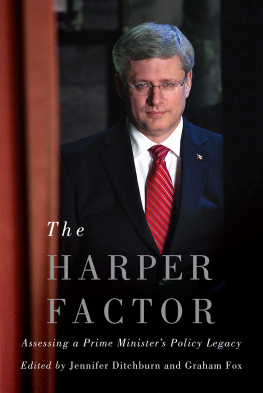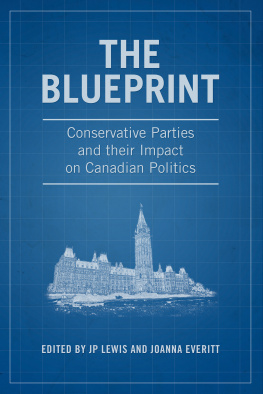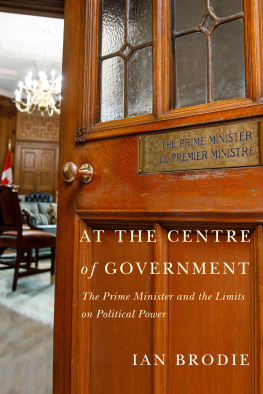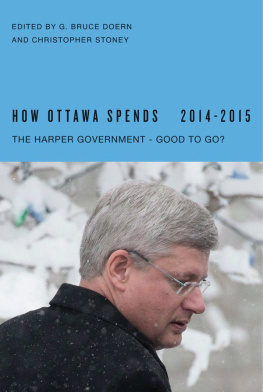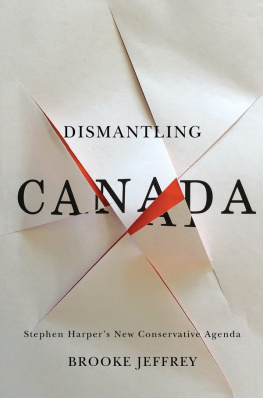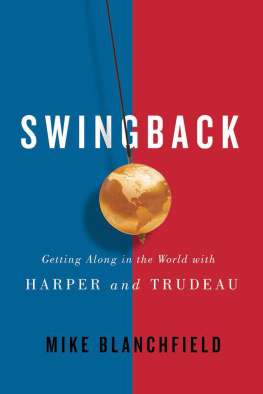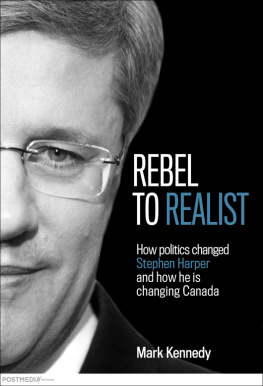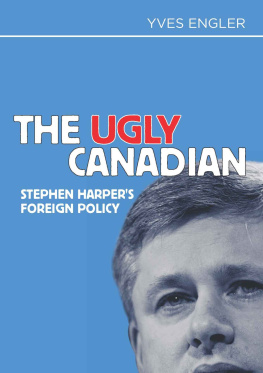THE HARPER FACTOR
The
HARPER
FACTOR
Assessing a Prime Ministers Policy Legacy
Edited by
Jennifer Ditchburn and Graham Fox
McGill-Queens University Press
Montreal & Kingston London Chicago
McGill-Queens University Press 2016
ISBN 978-0-7735-4870-1 (cloth)
ISBN 978-0-7735-4871-8 (ePDF)
ISBN 978-0-7735-4872-5 (ePUB)
Legal deposit third quarter 2016
Bibliothque nationale du Qubec
Printed in Canada on acid-free paper that is 100% ancient forest free (100% post-consumer recycled), processed chlorine free
McGill-Queens University Press acknowledges the support of the Canada Council for the Arts for our publishing program. We also acknowledge the financial support of the Government of Canada through the Canada Book Fund for our publishing activities.
Library and Archives Canada Cataloguing in Publication
The Harper Factor / edited by Jennifer Ditchburn and Graham Fox.
Issued in print and electronic formats.
ISBN 978-0-7735-4870-1 (hardback). ISBN 978-0-7735-4871-8 (ePDF). ISBN 978-0-7735-4872-5 (ePUB).
1. Harper, Stephen, 1959. 2. Harper, Stephen, 1959 Influence. 3. CanadaPolitics and government20062015. 4. CanadaHistory21st century. I. Ditchburn, Jennifer, editor II. Fox, Graham (Graham William), 1974, editor
FC650.H37 2016 | 971.073 | C2016-905039-4 |
C2016-905040-8 |
This book was set in Minion Pro Condensed.
Contents
Jennifer Ditchburn and Graham Fox
Graham Fox
R. Paul Wilson
David Zussman
Jennifer Ditchburn
Susan Delacourt
Colin Robertson
Murray Brewster
David Dodge and Richard Dion
Laura Dawson
Ratna Omidvar
Tasha Kheiriddin
Cynthia Wesley-Esquimaux
Barry K. Wilson
Michael B. Decter
George Hoberg
Jennifer Ditchburn and Graham Fox
Illustrations
FIGURES
TABLES
Acknowledgments
T his book was made possible only by the incredible generosity of its contributors. It is their insights into Prime Minister Harpers legacy in their respective fields that make this volume such a unique contribution to our understanding of the impact of the Conservatives time in government. Each author has produced a thoughtfuland thought-provokinganalysis that is sure to inform our collective assessment of the Harper decade. For the generosity with which they shared their expertise and insights and the countless hours spent preparing the manuscript, we thank each of them most sincerely.
We also want to thank colleagues and friends who acted as informal advisers on this project, helping us design the frame for the book, approaching prospective contributors, and reviewing any one of several drafts. Your sound advice proved invaluable in getting the book all the way to the printing press. Specifically, we want to thank Manuel Crdenas for his work in preparing the manuscript for production.
We want to thank our families for their support and understanding during all those hours we spent at a computer instead of at the park or the arena: Greg Loyst, Amaya and Gabriela (Jennifer); and Vronique Mauffette, Sophie, Sarah and Nicolas (Graham).Your love and enthusiasm mean the world to both of us, and we simply could not have done it without you.
Finally, to those who call for a political culture that deals more in complexity and nuances than in binary choices and absolutes, and who demand an approach to public policy that is informed more by evidence than by partisanship, this book is our small contribution to your efforts.
Jennifer and Graham
THE HARPER FACTOR
Introduction
O ne of the most memorable images from the 2015 Speech from the Throne was that of three right honourable gentlemen laughing and chatting in a moment of uninhibited bonhomie. Former prime ministers Joe Clark, John Turner and Jean Chrtien sat in a corner at the front of the Senate Chamber, watching on as Prime Minister Justin Trudeau took his seat near Governor General David Johnston for the ceremony so steeped in history.
The new Liberal government, for which the cultivation of symbols is a modus operandi, selected the invitees in the Senate Chamber with care. The presence of three former prime ministers with roots in different political parties was surely meant to telegraph a notion of public service that is elevated above partisan considerations, and a spirit of fraternity with those who had previously been called to serve. The gathering before the speech had more the feel of an academic convocation than a political exercise.
It was clear from the opening passages of the Speech from the Throne, however, that the magnanimity on display did not extend to Trudeaus immediate predecessor. Much of the document was a direct repudiation of the government of Prime Minister Harper, defeated a few short weeks before.
Let us not forget that Canadians have been clear and unambiguous in their desire for real change. Canadians want their government to do different things, and to do things differently, read the text. They want to be able to trust their government.
The government immediately set about reversing a number of Stephen Harpers policies. It reinstated the long-form census and committed to establishing an inquiry into murdered and missing Indigenous women. It pledged to limit the use of omnibus bills to pass its legislative agenda through Parliament, and put new constraints on government-funded advertising. Within a month of his swearing-in, Prime Minister Trudeau met with the premiers to discuss how they could work together to reduce greenhouse gas emissions and put a price on carbon. The message was that in tone, and in deed, the Trudeau government aimed to be different.
The 2015 election appears to have been a repudiation of Stephen Harpers government. After almost a decade in power, the former prime minister came to elicit strong feelings in many voters. A few months after the election, Abacus Data surveyed Canadians on their impressions of prime ministers stretching back to Joe Clark. At 55 per cent, Harper received the highest negative response of any of them, and by a significant margin.
What was less clear was whether Canadians were rejecting the man and his way of conducting politics, or his policies as well. Most analyses of Harpers time in office have to date focused on his approach to politics and its supremacy over public policy. But there have been precious few analyses of his actual impact on public policy. What is Stephen Harpers record when it comes to public policy?
When he was sworn in as Canadas twenty-second prime minister in February 2006, Harper inherited a country worn down by the scandals and infighting of the previous government. The economy was growing at a healthy clip, but leadership struggles of the Liberal Party superseded most matters of public policy in news coverage of national politics. The sponsorship scandal had gravely eroded public trust in government. Internationally, Canada was at war against the Taliban and al-Qaeda in Afghanistan, and although it was still active in multilateral forums, its influence in the world had begun to wane. At home, the federal government was amassing sizeable budgetary surpluses, and had been for years, but the provinces were struggling to balance theirs. The party system was fragmented along regional lines, and it seemed likely that it would remain that way for some time to come. And although the Liberal government of Paul Martin launched a number of national initiatives, the partys minority status and brief time in office conspired to ensure few of these initiatives would be firmly established by the time the 20056 campaign began. Managing Parliament as a minority would certainly pose significant challenges for the Conservatives, as it does for all minority governments, but there was little in the previous governments record to bind Harpers actions once he took office.

